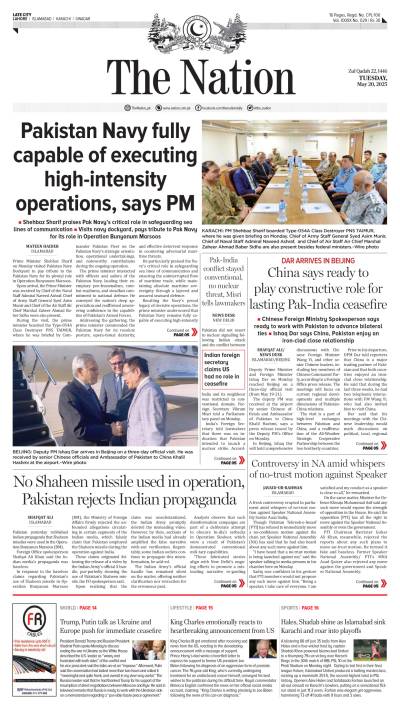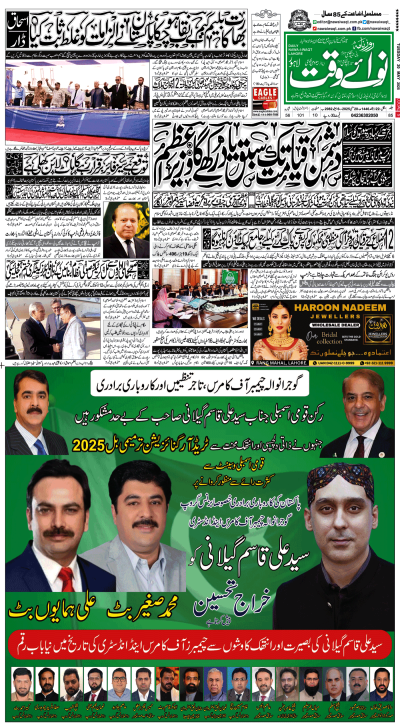History provides irrefutable evidence that developed nations owe their journey towards achieving that status to the role of their visionary leaders, enduring political stability, and the continuation of established policies through national consensus over a long period.
A leader is a visionary individual who inspires and mobilises the population for the fulfilment of national goals, promotes unity and social cohesion, sets the direction for economic policies, helps devise an effective system of governance with greater emphasis on the overall welfare of society and the nation, and whose sole objective—unlike politicians, whose primary motive is to seize political power—is to strive for nation-building. Under his or her uncompromising leadership, the people align themselves with this vision and work dedicatedly for national progress.
The unfortunate reality of Pakistan is that, after its founding father, it has never had a leader capable of leading the nation on the path he envisioned. Its journey as an independent state has been marred by frequent disruptive episodes, military coups, and self-serving politics by politicians and their allies, who have focused more on building their own fortunes than on establishing a system of governance geared towards the welfare of the masses. Their policies have mostly benefited the elitist class. The result is plain to see: even after more than seven and a half decades of independence, the country is struggling to find its direction, plagued by persistent economic and political crises in addition to the rise of fissiparous tendencies inimical to national unity and integration.
The dilemma is that the politicians and political parties have not learned from their past mistakes and do not seem inclined to rectify them. They are still engaged in power politics, with no commitment to national goals.
The country is wading through its worst-ever economic and political crisis at present, for which the entire responsibility lies with our politicians and, in the current context, more so with the confrontational and disruptive politics of PTI.
If the country is to move forward on the path of development, it will need political stability to act as a catalyst for the much-needed economic turnaround. The zero-sum game currently being played will take us nowhere, and we will remain crisis-prone for an indeterminate period. In the end, every stakeholder will lose.
In politics, there is no room for violence or rebellion against the state to achieve narrow political agendas. Political parties must act in accordance with their defined and universally accepted roles. In the absence of a true leader, it is the collective responsibility of all political forces and entities to work dedicatedly for promoting the well-being of the people and the interests of the state. They can only fulfil this role by showing restraint, giving space to their opponents, and tolerating dissent. Protesting against government policies is an integral part of a political system. However, this must be done in conformity with the law and the constitution of the country.
It is heartening to note that, as a result of the combined efforts of the incumbent government and establishment through the SIFC, there are visible signs of an economic turnaround. This process needs to be supported and accelerated, setting aside narrow political agendas. The buoyancy exhibited by the stock exchange, the decline in inflation, and commitments for foreign investment from friendly countries are strong indicators of economic recovery.
Accelerating this process will require political stability; without it, maintaining momentum will likely be difficult. This is the right time for our politicians and political parties to use their collective wisdom and energy to revive the economy by ensuring political stability, which will ultimately create a win-win situation for all stakeholders. Politicking can wait for better times.
There is therefore an urgent need for dialogue between political parties regarding a direction-setting initiative that enjoys consensus among all stakeholders. Furthermore, the best forum for resolving contentious issues and introducing the required reforms in the system of governance is parliament.
The present political crisis, as well as many of those in the past, owes its emergence to allegations of electoral rigging. This demonstrates that there is something fundamentally wrong with how we elect our representatives. In my view, the root cause of this problem is the single-constituency system, which places undue importance on numbers games and power politics and also facilitates rigging. Party leaders are often blackmailed by groups of electables. This system also makes it easier for forces inimical to democracy to influence the formation and dissolution of governments. It is prone to horse-trading and, above all, only promotes elitist culture, as only wealthy individuals and the landed aristocracy can afford to contest elections due to the costs involved. It is estimated that contesting elections for national and provincial assemblies costs nearly 100 million rupees per candidate, in addition to whatever price is paid to secure the party ticket.
The best alternative to eliminate these ills is a switch to the proportional representation system. Under this system, people cast their ballots for parties, and the parties receive representation in legislative bodies according to the percentage of votes obtained. The system also ensures the participation of smaller regional parties in mainstream politics, discouraging fissiparous tendencies. It empowers parties to present a list of individuals they wish to represent them in parliament and allows them to withdraw non-conformist members.
Since almost all political parties have been victims of alleged rigging, it is incumbent upon them to unite and eliminate this irritant once and for all by adopting the proportional representation system. To ensure the system’s success, it is necessary to make voting compulsory for all registered voters. It is also imperative to develop a voting system using new technologies to eliminate any chances of tampering with results.
Niccolò Machiavelli said, “Politics have no relation to morals.”
And Will Rogers said, “If you ever injected truth into politics, you would have no politics.”
Malik Muhammad Ashraf
The writer is a freelance columnist. He can be reached at ashpak10@gmail.com.





